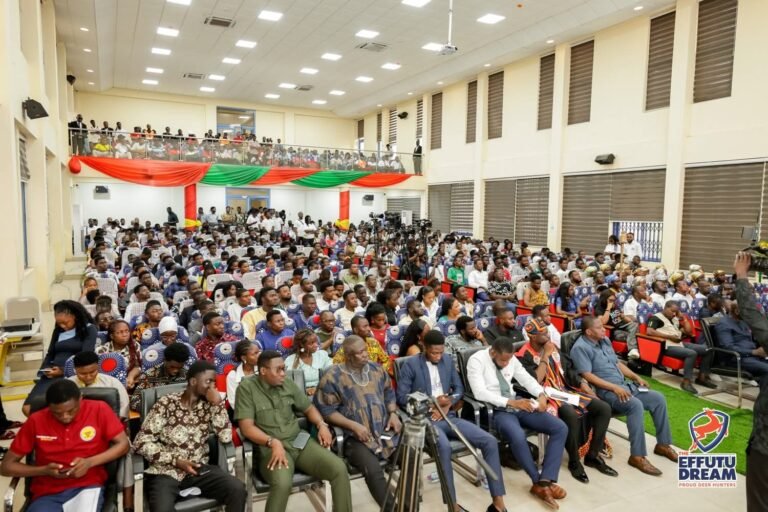
Samuel A. Jinapor, Minister of Lands and Natural Resources (middle) with personnel of Gold Fields Ghana Limited
Since our national independence, the mining sector has been known to create huge numbers of jobs – from deep pit actors and metal workers, through engineers and construction workers, to the vibrant service industry.
Traditionally, it has also been the case that it facilitates generation of residential areas, including attracting natural amenities like schools and hospitals.
But for the negligence and lack of monitoring of the sector that created an illegal, parallel sector (galamsey), regular mining companies were solid partners who supported both community and national development.
Unholy attraction
As we would admit, the ‘curse’ angle to mining occurred because a section of our politicians and their hangers-on chose to move into the space for profit purposes. This was possible, in part, because we had failed to design frameworks that would expand the sector with growth and development as well as job creation at the fore.
For 30 odd years, therefore, we all looked on while pig-headed youth and community goons conspired to dilute the economic space.
In an era that saw mining companies exiting because of the Rawlings anti-business factor, the irresistible urge on hapless youth to take risks and invade spaces that were being left vacant by the GoldenRaes and others became stronger.
Declining agriculture
It was when we realised that agriculture was threatened and farmers’ kids were abandoning cocoa farms into mining, because it provided cheap results, that we began to wise up. Consequently, we reignited reforms in the sector with the Mass Cocoa Spraying initiatives that boosted production and returned Ghana to its original place among top world producers under the John Kufuor administration.
Meanwhile, researches were showing that our farmers were aging, without the next generation being attracted to replace them, as it existed in neighbouring countries, including Cote d’Ivoire and Burkina Faso, which particularly had a huge chunk of their vegetable farmers within the 40 and 55 age bracket.
Little wonder, Ghana failed to compete with Burkina Faso in vegetable production up to 2016, before we launched the Planting for Food and Jobs and Planting for Export initiatives.
Water production
Apart from those worries, we also suffered increasing costs to water production, with poor sanitation habits combining with pollution of water bodies to undermine our capacity to produce enough water for commercial and domestic use across the country.
Along with that came threats to diseases and reduction in life expectancy, as negative migration created criminals without addresses in mining communities in the Ashanti, Eastern and Western regions. As we would admit, that manifested in local lawless folk attacking platoons of soldiers sent to fight galamsey and the consequent killing of a top military officer in broad daylight.
Transformed environment
While it may have taken us too long to radically transform the environment, we can still take consolation in the fact that the threats to agriculture and water production as well as degradation of our forests reserves and wildlife have reduced.
More importantly, with the relevant frameworks now in place, we may conveniently, together with the established mining companies, begin operations under a regulated environment that still creates jobs and allows government its stakes in the strategic sector.
We believe that when the sector Minister calls for the building of a viable mining hub, he has in mind a win-win situation. This should be a situation in which the youth who would have wished to migrate to Kumasi or Accra can find hope in their backyards and choose between agriculture and formalised mining, without harming the communities or residents.
The refreshing story is that under such a new environment, small-scale miners, companies, farmers, inland fishermen, market women and beneficiary communities will be united in sharing economic and social space, without any party losing.







